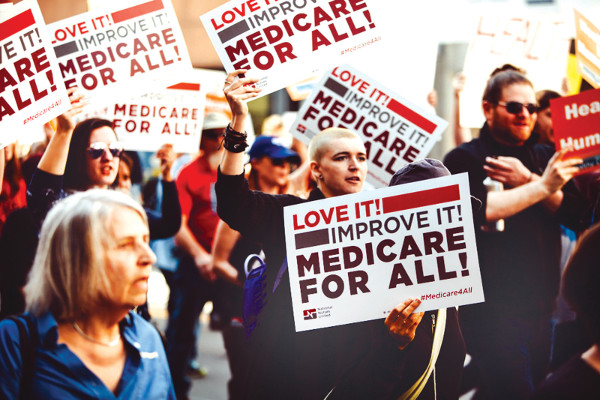
PHOTO/MOLLY ADAMS
On Sept. 25, disabled people once again led the fight for everyone’s health care when they disrupted a US Senate Finance Committee hearing on the worst bill yet, the Graham-Cassidy bill, which would repeal and replace Obamacare. The demonstrators chanted “No cuts to Medicaid! Save our liberty!” When Sen. Lindsey Graham (R-SC), one of the bill’s sponsors, entered the room, they chanted “Shame! Shame!” When the protesters were removed, committee Chairman Sen. Orrin Hatch (R-UT) told people in the room to be quiet or “get the heck out of here.”
The bill, which has been withdrawn for now, would hurt everyone’s health care, and especially the most vulnerable—the poor, the disabled, the elderly and those with chronic and pre-existing conditions. Among other things, it would end Medicaid as we know it, a health program that serves 74 million poor and disabled people. It would cut public subsidies that help people pay for private insurance, and leave people with pre-existing conditions without coverage. Millions would lose their access to care.
Obamacare helped many of us, but it still leaves some 26 million uninsured, and was basically set up to subsidize the health care industry. What we need is not some continuation of the privately owned health care system. We need universal health care, free at the point of service and paid for by taxing the wealthy and the corporations. We could start by improving Medicare, the public insurance program for the elderly, and expanding it to cover everyone. This would do away with the private insurance industry and give everyone coverage.
Most industrialized societies, and even some developing ones, have publicly funded health care systems that provide care for everyone, or at least some kind of insurance that covers everyone. The US has some publicly funded care, such as for veterans and the active military, and we have some publicly funded insurance for certain groups, such as Medicare and Medicaid, but every attempt to provide anything like true universal health care in this country has been attacked as “socialized medicine.”
So what does “socialized medicine” really mean? It means we don’t have to worry about getting care when we’re sick or injured. It means we get all the care we need for free, for a lifetime. It means we don’t have to fear being impoverished by an illness or accident. It means we don’t have to wonder if we can afford the medications we need. And it means taking one more step toward building a new society where we, the people, are in charge, instead of a handful of billionaires.
But the corporate-controlled government doesn’t want socialized medicine. One reason is there are huge profits to be made in the $3.2 trillion health care industry. Another is that advancing technology means fewer workers are needed every day, and the corporations don’t want government to spend money that could go into their pockets providing health care for laborers they don’t need. A third reason the corporate class and their politicians oppose socialized medicine is that they are terrified that we, the people, might figure out we don’t need them. The reality is, either the corporations are going to own our healthcare and hand out tidbits of inferior care at unaffordable prices, or the people are going to own it and make quality care a public right for all.

